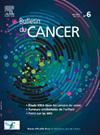[头颈颅底肿瘤治疗期间的辐射致耳毒性]。
IF 0.8
4区 医学
Q4 ONCOLOGY
引用次数: 0
摘要
放疗,不论有无顺铂,都是头颈癌和颅底肿瘤治疗的基石。然而,它具有显著的耳毒性风险,影响耳蜗和前庭器官,对听力、平衡和整体生活质量产生重大影响。患者可能会出现听力损失、耳鸣或前庭疾病,这些都会使人虚弱。这种毒性源于复杂的机制,包括对感觉细胞的直接损伤、局部缺血和炎症反应,导致听觉和前庭功能的进行性下降。尽管诸如调强放疗(IMRT)之类的技术进步有助于限制对听觉结构的剂量,但这些副作用仍然很常见。严格的听力监测和优化治疗方案对于减轻其影响至关重要。辐射引起的耳毒性仍然是头颈部肿瘤学的主要挑战,需要多学科的方法来保持患者的生活质量。本文章由计算机程序翻译,如有差异,请以英文原文为准。
Ototoxicité radio-induite au cours du traitement des tumeurs des voies aéro-digestives supérieures et de la base du crâne
La radiothérapie, combinée ou non au cisplatine, constitue un pilier du traitement des cancers ORL et de la base du crâne. Cependant, elle expose à une ototoxicité significative, touchant la cochlée et l’appareil vestibulaire, avec des répercussions majeures sur l’audition, l’équilibre et la qualité de vie. Les patients peuvent développer des surdités, des acouphènes ou des troubles vestibulaires parfois invalidants. Cette toxicité repose sur des mécanismes complexes incluant des dommages directs aux cellules sensorielles, une ischémie locale et des réponses inflammatoires, conduisant à une dégradation progressive des fonctions auditives et vestibulaires. Malgré les avancées techniques, comme la radiothérapie conformationnelle avec modulation d’intensité (RCMI), permettant de limiter les doses reçues par les structures auditives, ces effets secondaires restent fréquents. Un suivi audiométrique rigoureux et l’optimisation des stratégies thérapeutiques sont essentiels pour en limiter l’impact. L’ototoxicité radio-induite demeure un défi majeur en oncologie ORL, nécessitant une prise en charge multidisciplinaire pour préserver la qualité de vie des patients.
Radiotherapy, with or without cisplatin, is a cornerstone in the treatment of head and neck cancers and skull base tumors. However, it poses a significant risk of ototoxicity, affecting the cochlea and vestibular apparatus, with major repercussions on hearing, balance, and overall quality of life. Patients may experience hearing loss, tinnitus, or vestibular disorders that can be debilitating. This toxicity stems from complex mechanisms, including direct damage to sensory cells, local ischemia, and inflammatory responses, leading to a progressive decline in auditory and vestibular functions. Despite technical advances such as intensity-modulated radiotherapy (IMRT), which helps limit doses to auditory structures, these side effects remain common. Rigorous audiometric monitoring and optimization of therapeutic protocols are essential to mitigate their impact. Radiation-induced ototoxicity remains a major challenge in head and neck oncology, requiring a multidisciplinary approach to preserve patients’ quality of life.
求助全文
通过发布文献求助,成功后即可免费获取论文全文。
去求助
来源期刊

Bulletin Du Cancer
医学-肿瘤学
CiteScore
1.90
自引率
16.70%
发文量
224
审稿时长
37 days
期刊介绍:
Without doubt, the ''Bulletin du Cancer'' is the French language publication of reference in the field of cancerology. Official organ of the French Society of Cancer, this journal covers all the information available, whether in the form of original articles or review articles, but also clinical cases and letters to the editor, including various disciplines as onco-hematology, solids tumors, medical oncology, pharmacology, epidemiology, biology as well as fundamental research in cancerology. The journal proposes a clinical and therapeutic approach of high scientific standard and regular updates in knowledge are thus made possible. Articles can be submitted in French or English.
 求助内容:
求助内容: 应助结果提醒方式:
应助结果提醒方式:


